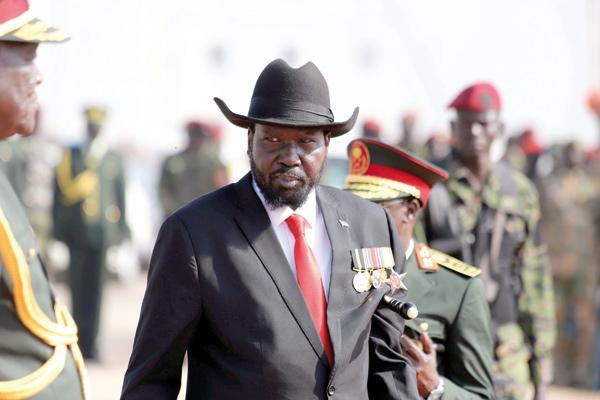You are here
South Sudan hires US lobby group to block war crimes court
By AFP - Apr 30,2019 - Last updated at Apr 30,2019

South Sudan’s President Salva Kiir attends a medal-awarding ceremony for long serving servicemen of the South Sudan People’s Liberation Army in Bilpam, the military headquarters, in Juba, South Sudan, on January 24 (Reuters photo)
NAIROBI — South Sudan’s President Salva Kiir has hired an American lobby group run by a former ambassador to block the creation of a court to judge war crimes in the conflict-torn nation.
According to a contract between the government and the lobby group, Gainful Solutions, published online by the US Department of Justice, the $3.7 million deal was signed on April 2.
The contract states that Gainful Solutions, run by former US ambassador to Kenya, Michael Ranneberger, was hired to “improve relations with the United States, both politically and economically”.
This includes persuading Trump’s government to “reverse sanctions and prevent further sanctions” and to mobilise American investment in South Sudan’s oil.
However, in a clear indication of the government’s hostility to the proposed body, the contract also states that the lobby group must “delay and ultimately block establishment of the hybrid court” envisaged in a peace deal signed in September 2018.
The creation of the African Union-South Sudanese hybrid court dates back to an earlier peace agreement in 2015, a bid to win justice for atrocities committed during a war that is now in its sixth year.
Six years of war
Conflict erupted in December 2013 after Kiir accused his longtime rival and former vice president Riek Machar of plotting a coup against him.
Battles between those from Machar’s Nuer community and Kiir’s Dinka people were characterised by brutal violence on both sides, rape and UN warnings about “ethnic cleansing”.
The war has left around 380,000 people dead, forcing more than 4 million South Sudanese — almost a third of the population — to flee their homes.
Kiir and Machar are meant to reunite in a power-sharing government in less than two weeks, under the terms of the September deal.
Implementation of the peace deal is running behind however, and Machar has called for a delay.
The United States, Norway and Britain — the so-called troika leading diplomacy efforts — said in a statement on Tuesday that the peace deal was at a “critical juncture”.
“Any decision on forming the transitional government as scheduled or delaying to a later date should be made through consensus of the parties,” read the statement.
‘Lack of political will’
South Sudan’s government has previously pushed back against the creation of the court, dismissing it as “a tool of regime change” by foreign partners.
In February a United Nations human rights report on South Sudan said the process of setting up the court had stalled due to “lack of political will and uncertainty about the future of government”.
US ambassador to South Sudan, Thomas Hushek, described the contract with the lobby group as disturbing.
“This, to me, is very disturbing because this is a commitment made in the peace agreement. The hybrid court is part and parcel of chapter five of the peace agreement,” Hushek said, according to Eye Radio in Juba.
Ranneberger retired in 2016 after a long diplomatic career in Africa, and served as ambassador to Kenya and Somalia from 2006-2011.
While in his post he spoke strongly against corruption in Kenya, and angered government when diplomatic cables revealed by WikiLeaks showed him criticising the country’s leaders for graft and political violence.
He was well versed in the crises gripping South Sudan, having helped lead the negotiations between the south and Khartoum, which led to a peace deal in 2005 after a long independence war.
South Sudan later voted in favour of independence from Sudan in a 2011 referendum.
After midwifing its independence, the United States remains South Sudan’s main international donor, providing more than $480 million in humanitarian aid in 2018, according to US State Department figures.
However their patience has worn thin with South Sudan after countless failed peace efforts, and ties between Juba and Washington have chilled.
The US lobbied hard for an arms embargo imposed in 2018, and has also applied sanctions against top officials.
Related Articles
JUBA — South Sudan’s President Salva Kiir said on Wednesday that a six-month delay agreed with his rivals for the formation of a unity
NAIROBI — South Sudan’s six-month-old peace deal is doomed to collapse unless the sides can settle a string of disputes and bring forme
JUBA — South Sudan President Salva Kiir on Tuesday urged rebel chief Riek Machar to return to Juba during a speech to parliament i











